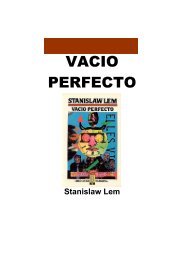cambridge-crime-fiction
cambridge-crime-fiction
cambridge-crime-fiction
Create successful ePaper yourself
Turn your PDF publications into a flip-book with our unique Google optimized e-Paper software.
laura marcus<br />
McHale uses The Name of the Rose as a way of conceptualising the nature of<br />
the divide between modernist and postmodernist <strong>fiction</strong>. ‘A modernist novel’,<br />
he argues (in my view reductively), ‘looks like a detective story. Classic detective<br />
<strong>fiction</strong> is the epistemological genre par excellence.’ 51 Modernist <strong>fiction</strong>s,<br />
from Henry James to ‘the late-modernist epistemological quests of Joseph<br />
McElroy’, ‘revolve round problems of the accessibility and circulation of<br />
knowledge, the individual mind’s grappling with an elusive or occluded reality’.<br />
Eco’s novel would seem to be part of this grouping, and to dramatise<br />
an epistemological quest, but in its construction of a detective who fails it<br />
properly belongs with the genre of the ‘anti-detective novel’, and with those<br />
<strong>fiction</strong>s which ‘by deliberately crippling the detective story’s epistemological<br />
structure,...ineffect evacuate the detective story of its epistemological thematics’.<br />
‘What rushes in’, McHale asks rhetorically, ‘when the anti-detective<br />
story empties the detective model of its epistemological structure and thematics?<br />
What else but ontological structure and thematics: postmodernist<br />
poetics.’ 52<br />
McHale locates the ‘postmodernism’ of The Name of the Rose in its<br />
meta<strong>fiction</strong>ality and ‘its relative ontological “weakness” vis-à-vis its own<br />
author, whose presence it reveals “behind” it’; in its strategies for destabilising<br />
the projected world of the novel itself, including deliberate historical<br />
anachronism; in its characteristically postmodernist themes of labyrinthine<br />
and disorientating space and of displaced apocalypse, in which a parallel<br />
is drawn between the destruction of a book, figurative (through the exposure<br />
of its <strong>fiction</strong>ality) or literal, and the destruction of a world. Finally he<br />
argues, however, that the novel cannot be located as either modernist or<br />
postmodernist, and that ‘it calls into question the entire opposition of modernist<br />
post-modernist’. 53 It is an ‘amphibious’ text which serves to trouble<br />
the literary-critical tendency to reify categories which can never be anything<br />
but ‘literary-historical discursive constructs’. 54 This argument has some relation<br />
to Teresa de Lauretis’s more cynical claim that ‘in The Name of the<br />
Rose Eco wants to “have his carcase” – he wants a mystery both with and<br />
without solution, a text both open and closed, an epistemology with and<br />
without truth’. 55<br />
Paul Auster’s The New York Trilogy (City of Glass, Ghosts, The Locked<br />
Room) also deploys and subverts the conventions of detective <strong>fiction</strong>, and<br />
in particular the private eye novel, in its explorations of identity, authorship<br />
and narrative. In all three parts of the trilogy, the central figures (only one of<br />
whom, that of The Locked Room, isafirst-person narrator) are called into<br />
service as detectives in ways familiar from the <strong>fiction</strong> of Raymond Chandler<br />
or Dashiell Hammett: a phone call, a visit from a mysterious stranger, a<br />
letter. Yet from the very start the interpellations do not establish and secure<br />
258



